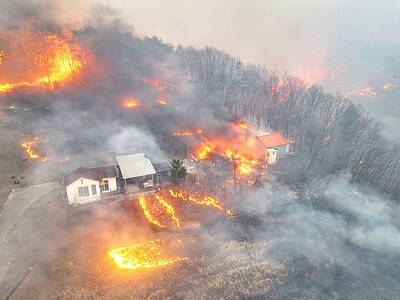The bodies of 17 German soldiers, who were executed by the French Resistance during World War II in an act of revenge for the killings of villagers, were exhumed on Tuesday from a mass grave in south-west France.
The men were shot in 1944 in a field on the outskirts of Saint-Julien-de-Crempse, a village in the Dordogne, in an unsanctioned act of retribution for the deaths of 17 residents at the hands of German soldiers.

PHOTO: AP
Villagers and German officials returned to the meadow yesterday to recover the corpses from a burial site whose location had long been a secret. It took just over six hours to remove their remains, in a sober ceremony which evoked uncomfortable memories.
For decades no one has been willing to speak about the affair and it was only the uneasy conscience of one of the Resistance fighters who helped capture the Germans that led to the revelation of the grave's existence.
Throughout his life, Emile Guet, 82, had been troubled by the action of his comrades. This sense of guilt spurred his determination to find the grave so the Germans could be given a formal burial.
The dead men were part of a battalion of 82 soldiers who had surrendered to Mr Guet's Resistance unit during the liberation of Bergerac, on Aug. 24, 1944.
In exchange for their surrender, Mr Guet said the men were given a guarantee by his superiors that they would be treated as prisoners of war. But local rage at the German army's conduct meant this promise was broken.
During that month's violent fighting, several German soldiers had been killed by the Resistance in a battle at Saint-Julien-de-Crempse.
In return, the Germans had rounded up the 17 men who remained in the village -- aged between 18 and 80 -- and killed them.
One month later, on Sept. 9, a group of Resistance fighters, who were acting without the knowledge of their superiors, decided to take their own revenge and removed 17 German soldiers from their cells in the Bergerac prison, transported them to a field near Saint-Julien-de-Crempse, and shot them.
"It was a very shocking affair. Unarmed men were gunned down," Mr Guet told local reporters. "My commander had given his word. He had told them they would be treated like prisoners of war."
He tracked down the only surviving witness -- a choirboy who had accompanied the priest to the soldiers' burial in a narrow, unmarked grave -- and together they identified the spot in a meadow outside the village. Andre Parvieux, 11 at the time, said yesterday: "When they were questioned, all the mayors, one after another, until 1997, denied any knowledge of German soldiers buried on their territory ... When this is over, a burden will be lifted."
But not all shared their satisfaction at the decision to disinter the bodies. One resident said: "The population has the impression that more importance is being given to this massacre than to the one which affected our village."
One by one the bodies were removed from the earth and laid on plastic sheets. The village priest blessed the remains.
Some of the men still had identity bracelets which will help trace relatives in Germany. The men will be reburied in a German military cemetery on Nov. 16.

DEATH CONSTANTLY LOOMING: Decades of detention took a major toll on Iwao Hakamada’s mental health, his lawyers describing him as ‘living in a world of fantasy’ A Japanese man wrongly convicted of murder who was the world’s longest-serving death row inmate has been awarded US$1.44 million in compensation, an official said yesterday. The payout represents ¥12,500 (US$83) for each day of the more than four decades that Iwao Hakamada spent in detention, most of it on death row when each day could have been his last. It is a record for compensation of this kind, Japanese media said. The former boxer, now 89, was exonerated last year of a 1966 quadruple murder after a tireless campaign by his sister and others. The case sparked scrutiny of the justice system in

DITCH TACTICS: Kenyan officers were on their way to rescue Haitian police stuck in a ditch suspected to have been deliberately dug by Haitian gang members A Kenyan policeman deployed in Haiti has gone missing after violent gangs attacked a group of officers on a rescue mission, a UN-backed multinational security mission said in a statement yesterday. The Kenyan officers on Tuesday were on their way to rescue Haitian police stuck in a ditch “suspected to have been deliberately dug by gangs,” the statement said, adding that “specialized teams have been deployed” to search for the missing officer. Local media outlets in Haiti reported that the officer had been killed and videos of a lifeless man clothed in Kenyan uniform were shared on social media. Gang violence has left

‘HUMAN NEGLIGENCE’: The fire is believed to have been caused by someone who was visiting an ancestral grave and accidentally started the blaze, the acting president said Deadly wildfires in South Korea worsened overnight, officials said yesterday, as dry, windy weather hampered efforts to contain one of the nation’s worst-ever fire outbreaks. More than a dozen different blazes broke out over the weekend, with Acting South Korean Interior and Safety Minister Ko Ki-dong reporting thousands of hectares burned and four people killed. “The wildfires have so far affected about 14,694 hectares, with damage continuing to grow,” Ko said. The extent of damage would make the fires collectively the third-largest in South Korea’s history. The largest was an April 2000 blaze that scorched 23,913 hectares across the east coast. More than 3,000

‘INCREDIBLY TROUBLESOME’: Hours after a judge questioned the legality of invoking a wartime power to deport immigrants, the president denied signing the proclamation The US on Friday said it was terminating the legal status of hundreds of thousands of immigrants, giving them weeks to leave the country. US President Donald Trump has pledged to carry out the largest deportation campaign in US history and curb immigration, mainly from Latin American nations. The order affects about 532,000 Cubans, Haitians, Nicaraguans and Venezuelans who came to the US under a scheme launched in October 2022 by Trump’s predecessor, Joe Biden, and expanded in January the following year. They would lose their legal protection 30 days after the US Department of Homeland Security’s order is published in the Federal